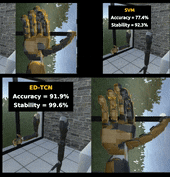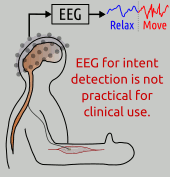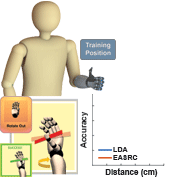Stable Responsive EMG Sequence Prediction and Adaptive Reinforcement with Temporal Convolutional Networks
https://www.embs.org/tbme/wp-content/uploads/sites/19/2020/05/TBME-00364-2019-Highlight-Image.gif
170
177
IEEE Transactions on Biomedical Engineering (TBME)
//www.embs.org/tbme/wp-content/uploads/sites/19/2022/06/ieee-tbme-logo2x.png
Movement prediction from EMG can be performed by compressing a short window of EMG into a feature-encoding that is meaningful for classification— an approach that can cause erratic prediction behavior. Temporal convolutional networks (TCN) leverage temporal information from EMG to achieve superior predictions for 3 simultaneous degrees-of-freedom that are more accurate and stable, have a very low response delay, and allow for novel types of interactive training. Addressing EMG decoding as a sequential prediction problem requires a new set of considerations that will lead to enhancements in the reliability, responsiveness, and movement complexity available from prosthesis control systems.
read more



